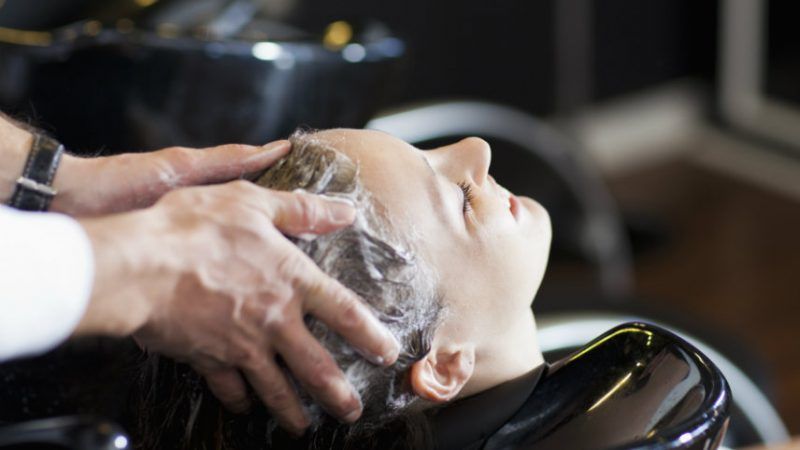Abolish Mandatory License for Shampooing Hair? California Lawmakers Will Consider It.
Unfortunately, California's Sunset Review process rarely leads to the sunset of anything.

One of my favorite Ronald Reagan quotations illustrates the problem of an ever-growing government: "Government programs, once launched, never disappear. Actually, a government bureau is the nearest thing to eternal life we'll ever see on this Earth!" In my decades covering public agencies, I can think of only a handful of rollbacks—and they usually ended up perversely expanding government power.
In one recent case, the Legislature gutted a state tax board, known as the Board of Equalization. But its powers merely were shifted from elected officials to bureaucrats in different agencies—and now California taxpayers are more frequently getting the shaft. That's how government works.
Last week, a simple bill (sponsored by my employer, the R Street Institute) would have rolled back licensing requirements for only one of the hundreds of trades and professions that require a state license to work. Burdensome education requirements, fees and testing become obstacles for lower-income people to get gainful employment that doesn't involve flipping burgers. The requirements often have no relevance to public safety, but usually are the result of powerful interest groups that use government to lock up some part of the market.
Last year, Sen. John Moorlach (R-Costa Mesa), introduced a bill that would have eliminated such requirements in a variety of fields, but it was a non-starter given its broad scope. It was referred to multiple committees and dead on arrival. This year Sen. Mike Morrell (R-Rancho Cucamonga) introduced legislation that targeted one particular—and particularly ridiculous—set of licensing rules involving people who want to shampoo, arrange, dress, and curl (but not cut) hair for a living.
If you shampoo hair for pay at, say, elderly people's homes or at a salon—and haven't spent as much as $19,000 at a barbering and cosmetology school—then you are an outlaw. It's illegal to do so in California. The Board of Barbering and Cosmetology posts this Frequently Asked Question on its website: "I would like to hire a person for the sole purpose of shampooing or preparing consumers services; can I do this?" The answer: "No, only a licensed barber, cosmetologist or apprentice can wash a consumer's hair or prepare a consumer for services."
Did I mention that a shampooer needs 1,500 hours of training, whereas a first responder/emergency medical technician only needs 120 to 150 hours of training? The Morrell bill passed the full Senate with only two "no" votes, but was killed last week in the Assembly Business and Professions Committee on a 14-3 vote in spite of the fact that most of us have shampooed our own hair for years without calamity.
The hearing room was packed with students from local cosmetology schools. It should surprise no one that the main beneficiaries of the current rules are the schools that charge hefty tuitions for such training, nor should it be a surprise that the state bureaucracy (the Department of Consumer Affairs) estimated excessive fee-revenue losses if the bill became law. Those estimates are hard to fathom given how unimaginable it is that people currently go through the whole licensing rigmarole and then only use the degree mainly to shampoo and arrange hair.
But government agencies see any kind of minor regulatory rollbacks as a threat to their authority. There's always that fear of the slippery slope. There's also an economic term known as "regulatory capture." It's typical in all aspects of government for industries that are being regulated to dominate the agencies that do the regulating.
The main argument that the Assembly Business and Professions Committee Chairman Evan Low (D-San Jose) used to oppose the bill is that the issue can be handled in the forthcoming Sunset Review hearings. The Assembly and Senate business and professions committees hold these annual hearings in the fall to "discuss the performance of the boards and make recommendations for improvements," according to the legislative website. The term "sunset" comes from the legislation, which would sunset the many boards out of existence unless they justify their existence.
This is one of those cool ideas that sounds much better in theory than in reality. Government agencies should indeed have to explain what they do to stay in business. But California's Sunset Review process rarely leads to the sunset of anything. S.B. 999's opponents note that the review led to legislation last year that eliminated the Board of Guide Dogs for the Blind. That was a welcome development, but the elimination of that pointless board was backed by regulators and the industry itself.
By contrast, S.B. 999 is opposed by the beauty industry and the bureaucracy. Nevertheless, I'll take legislators at their word and closely watch as they advocate for the end of onerous regulations that benefit business owners at the expense of aspiring low-income workers. Wouldn't it be great if California's Legislature turned out to be the exception that proved Reagan's rule?
Steven Greenhut is Western region director for the R Street Institute. He was a Register editorial writer from 1998-2009. Write to him at sgreenhut@rstreet.org.


Show Comments (16)